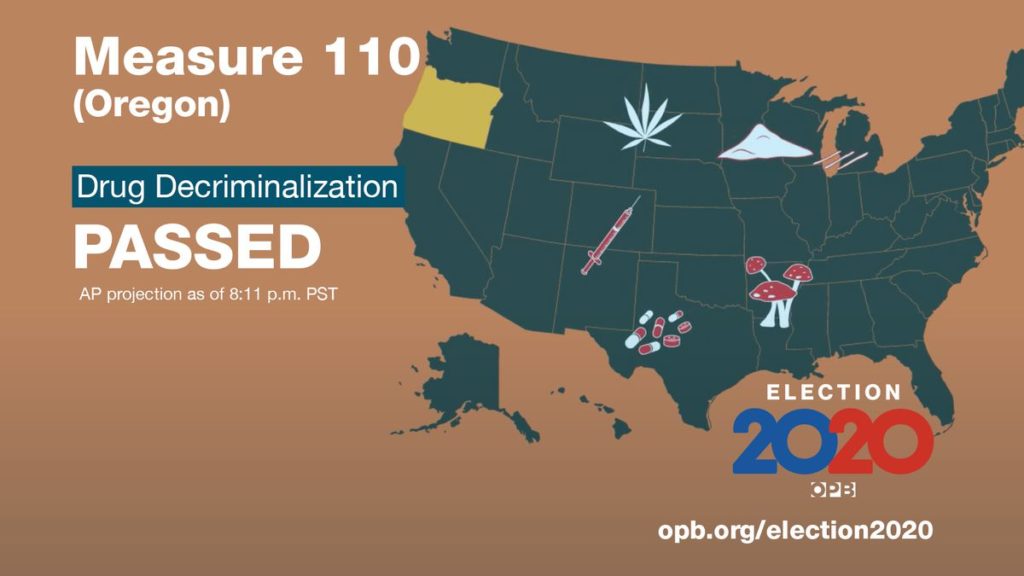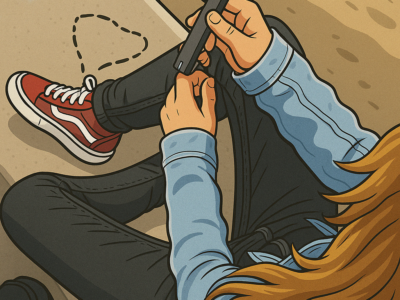Oregon passed a new measure to “decriminalize” all drugs, making it the first state to adopt this novel approach.
A look at Measure 110
On Tuesday November 3, voters in Oregon passed Measure 110, which works to expand addiction services in the state through marijuana tax revenue and state prison savings. The measure also makes personal, non-commercial, possession of a controlled substance no more than a Class E violation, carrying a maximum fine of $100. This fine will be waived if the person is assessed at a recovery center.
The measure passed 58.61% to 41.39%. “I think Oregonians made it clear that they support a more humane, effective approach to drug addiction,” said Anthony Johnson, one of the measure’s chief petitioners, on Tuesday night. “We took a huge step for funding more treatment and recovery services, and for ending racist drug war policies.”
The thought behind the Measure
Many of the people who supported the proposition feel that the way drug crimes are addressed in our country is not working. They say that drug crimes are treated as a criminal offense, instead of a health disorder. Health issues are treated with doctors and mental health issues with psychologists/psychiatrists. However, drug issues are treated with law enforcement; and supporters of the proposition think that is not the way it should be.
“It’s clear that the current approach of arresting and jailing people for their drug addiction has failed, and that people realized that Measure 110 was ultimately about people, not drugs.”
Anthony Johnson, Chief petitioner, Measure 110
The measure will also work to make it easier for people to get into drug treatment programs by funding Addiction Recovery Centers to be able to provide free screening, treatment, and referral services to drug users.

Opposition to the Measure
Opponents of the proposition say that the measure goes too far. They believe that passing a measure like this will support drug use habits and lead to more people using illegal substances. Many of the people who oppose this proposition are worried that it will increase use in youth and increase the amount of drug overdoses we see, which is already a huge epidemic in our country.
Many Oregonians believe that this measure isn’t about legitimizing drug use, but rather making it okay for them to seek help for drug use. On Tuesday night, Johnson said, “It’s clear that the current approach of arresting and jailing people for their drug addiction has failed, and that people realized that Measure 110 was ultimately about people, not drugs.”
DECRIMINALIZATION VS. LEGALIZATION
Portugal’s example
Portugal, which has decriminalized all drug use since 2001, makes it clear that decriminalization is not the same thing as legalization. This decision came after they were facing a horrible drug crisis where an astounding percentage of its population was hooked on some kind of hard drug. They decided to stop treating drugs as a criminal problem and start treating it as a health problem.
That’s not to say it’s a free-for-all, though. Drugs are still illegal. However, any person carrying less than 10 days’ worth of illicit substances, instead of being jailed, will have their supply confiscated and undergo an assessment with a social worker, psychologist and lawyer. Now, 19 years later, Portugal is seeing only approximately 30 deaths a year from drug overdoses, and low rates of long-term use. Because they were able to provide the extra services such as housing, mental health, physical rehabilitation, and therapy for addicts, they have nearly conquered their drug problem.
New territory
We are venturing into new territory for us here in America. It will be years until we see whether or not we were able to accomplish a similar result to Portugal, and whether or not it was the right decision for us. But I think that if we are able to provide people with the help they need, we will soon start seeing a decrease in drug-related harm.
Sources:
https://www.leafly.com/news/politics/portugal-drug-decriminalization-statistics
https://www.addictioncenter.com/addiction/addiction-statistics/


